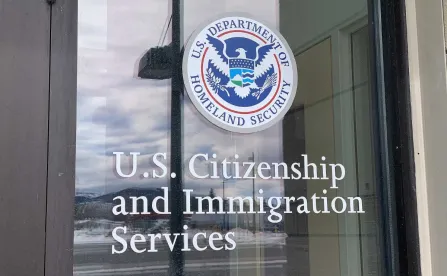U.S. Citizenship and Immigration Services (USCIS) recently provided further guidance on eligibility criteria for the International Entrepreneur Parole program (IEP).
Background
The IEP rule was promulgated at the end of the Obama administration. However, the Trump administration tried to remove the regulation and blocked its implementation by delaying the effective date of the rule. A lawsuit ensued, but very few IEP applications were adjudicated by USCIS.
In May 2021, DHS announced the continuation of IEP program. Since that time, applications have been adjudicated by USCIS, albeit at a slow pace. For additional background information about the IEP program, please see our April 22, 2021 alert.
The IEP program gives certain foreign nationals another option for temporary authorization in the United States to grow a business and work for that business. Although parole authorization is not a visa status, it affords foreign entrepreneurs authorization to enter (parole into) the US, remain in lawful status, and work to grow their businesses and make contributions to the U.S. economy, especially by creating jobs.
Eligibility for the International Entrepreneur Parole Program
To qualify for the IEP program, a foreign national must:
-
Have established a U.S. startup business within five years before the application for parole;
-
Hold at least a 10% ownership interest in the startup;
-
Play an active and central role in the operations of the business, and not merely be an investor; and
-
The startup must have received a capital investment of at least $264,147 from qualified U.S. investors or at least $105,659 in grants or awards from qualifying U.S. federal, state, or local government entities.
-
For capital investment, a qualified investor is defined as an individual who is a U.S. citizen or lawful permanent resident (LPR) of the U.S., or an organization that is located and operating in the U.S. and is majority owned and controlled by U.S. citizens or U.S. LPRs. The investor organization must also have regularly made substantial investments in start-up entities that subsequently exhibit substantial growth during the preceding 5 years. See the IEP regulations for more details.
-
Alternatively, an applicant who does not meet the criteria for investment or government grants may qualify based on compelling alternative evidence of the startup entity’s potential for rapid growth and job creation.
Benefits of the International Entrepreneur Parole Program
Entrepreneurs approved for parole may enter the U.S. for an initial period of 30 months, and may apply for an additional 30 months of parole for a total of five years to support the growth of the startup business. Ultimately, the goal of the business should be to create jobs in the United States.
A spouse and minor children are generally eligible for the same period of parole as the principal applicant. Spouses may also qualify for employment authorization, but a separate application must be submitted.
Notably, parole is not a visa status. As a result, if the entrepreneur is already in the U.S., s/he would have to travel out of the U.S., attend an appointment at a U.S. Consular Post, and request to be paroled into the U.S. IEP parole allows the entrepreneur to live and work in the United States, but it does not lead to or allow for a change to another visa status from within the U.S.
Eligibility for Extension of the International Entrepreneur Parole Program
To extend parole beyond the initial 30 months, the paroled entrepreneur must demonstrate some progression in terms of job growth, investment, and/or potential for future growth. The entrepreneur would have to submit evidence that:
The entrepreneur has at least a five percent ownership interest at the time of the re-parole application and continues to play a central role in the business; and show that the business:
-
Continues to operate, and meets one of three criteria:
-
Created at least five qualifying jobs; or
-
Received during the parole period at least $ $528,293 in qualifying investments, government grants, or awards, or a combination thereof; or
-
Generated at least $528,293 in U.S. revenue and averaged 20 percent in annual growth during the initial parole period.
Application Process for the International Entrepreneur Parole Program
Processing times for the IEP Program have been lengthy and unpredictable. USCIS has been generally approving applications for applicants who meet the eligibility criteria.
An application for International Entrepreneur Parole must include the following:
-
USCIS fees of $1,285;
-
Form I-941, Application for Entrepreneur Parole;
-
Organizational documents;
-
Company financial or tax records;
-
Evidence of at least 10 percent ownership interest;
-
Proof that the entrepreneur/applicant has central and active role in the startup entity;
-
Evidence of qualified investment, award or grant;
-
Evidence that the startup entity will create a significant public benefit.




 />i
/>i

